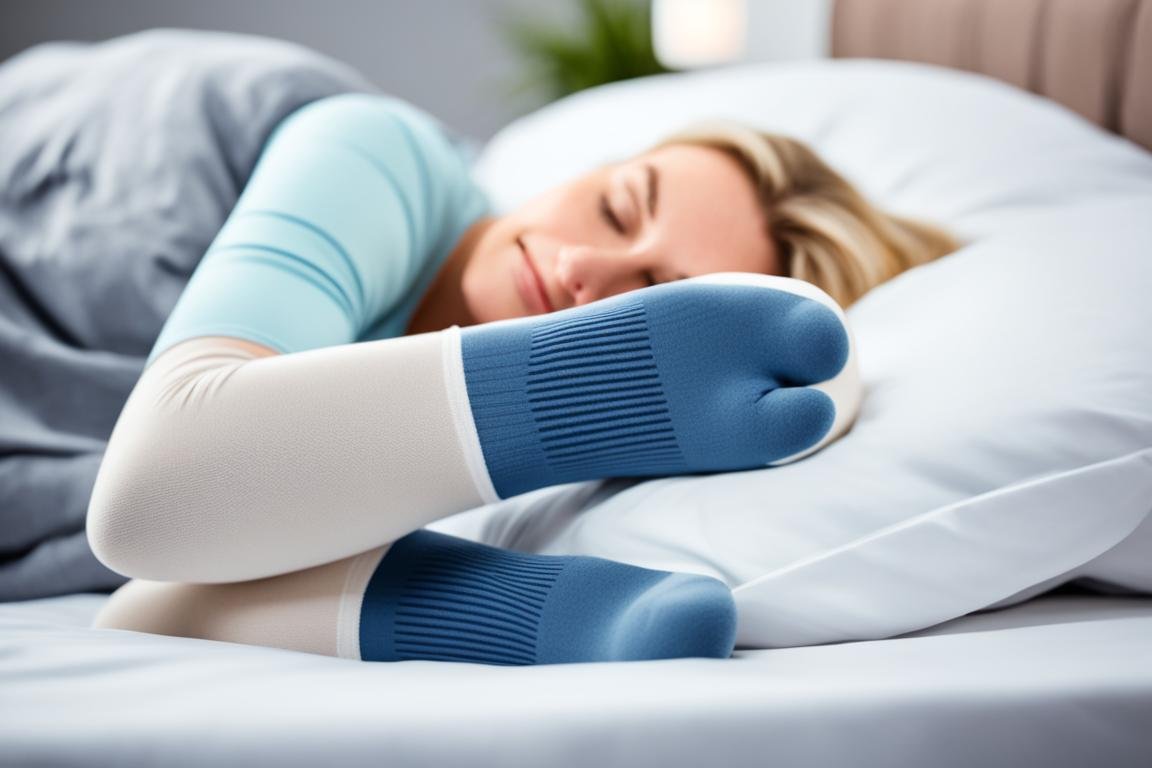Compression socks are great for many people. They help those with vein issues, athletes, and travelers. These socks reduce swelling, boost blood flow, and support recovery. But is it good to wear them while we sleep?
Dr. Douglas Joseph, a cardiovascular expert, offers advice. He says the best time to wear these socks is during the day. This is when you move around. The socks work with gravity to fight vein pressure better then. But lying down reduces this help.
It’s okay to sleep with them on, for a little while, like for a nap. Yet, the best thing is taking them off at night. It lets your skin breathe better. So, wearing them to bed isn’t bad, but it’s smart to give your skin a break.
Key Takeaways
- Compression socks work best while you move, thanks to gravity.
- Sleeping in them might not help your blood flow as much.
- It’s mostly okay to wear them to bed for a short while. But, it’s better to remove them for the night to keep your skin fresh.
- If you have vein issues or lymphedema, sleeping in them could be good for you.
- Keep your compression socks clean. Change them often to avoid irritation and infections.
Understanding Compression Socks
Compression socks gently squeeze your legs to help blood flow. They treat chronic venous insufficiency, where blood doesn’t flow well. When pressure is put on the calves, blood moves better.
They are good for reducing leg swelling in people on their feet a lot. This includes during athletic activity or travel.
What are Compression Socks?
These socks apply gentle pressure from your ankles to your thighs. They help blood circulate and fix issues like chronic venous insufficiency.
How Do Compression Socks Work?
They counter the veins’ increased pressure that gravity or sitting causes. This helps blood flow back to the heart better. It also lowers blood pooling and swelling.
Benefits of Wearing Compression Socks
There are many good things about wearing these socks, like:
- Helping with circulation and reducing leg swelling for less pain while sitting or standing
- Improved sports performance and quicker recovery
- Lessening symptoms of vein problems, such as leg pain
- Aiding in the healing of sores from chronic venous insufficiency
Overall, they keep your blood flowing well and your legs comfortable. This can lead to better health.
Can You Sleep in Compression Socks?
It’s okay to sleep in compression socks, but they may not help much. When you’re lying down, gravity’s effect is less. So, compression socks work best when you’re on your feet.
But, there are some cases where wearing them at night is good for you.
Addressing Circulation Issues
For those with vein disease and leg sores, wearing compression socks at night is a good idea. The socks aid the healing by boosting circulation. This process helps with conditions like venous insufficiency.
Protecting Sore Spots
Compression socks are great for guarding against and preventing leg sores, especially for those with vein disease. The right pressure can protect sensitive areas.
Reducing Swelling
Compression socks also lessen swelling by improving blood flow when you’re sitting or lying for long. This comfort is key for those with circulatory issues or edema.
Always talk to a doctor before using compression socks at night. They can help pick the right type for you.
Choosing the Right Compression Socks for Sleeping
When picking out socks for sleep, check the compression level. Go for socks with 15 mmHg or less for bedtime. They are comfy and don’t mess with your blood flow.
Compression Levels for Nighttime Use
Use socks with 15mmHg or less for night, they’re gentle. This level keeps your blood moving without hurting sleep. It also helps folks with low blood pressure issues.
Over-the-Counter vs. Prescription Options
You can buy socks over-the-counter or get a doctor’s prescription. Doctors suggest special socks for serious health problems. They make sure you get the best socks for your health.
Potential Drawbacks of Sleeping in Compression Socks
Sleeping in compression socks can be safe, but there are a few things to think about. The tightness can cause compression socks irritation, especially on the ankles and shins. This might lead to chafing or soreness.
Also, not washing the socks often can make bacteria grow. This makes you more likely to get diseases such as athlete’s foot. To avoid this, wear clean socks every day and give your legs a break at night.
sleep in compression socks
Sleeping in compression socks is not always needed. But, some people can benefit from it. For example, if someone has vein disease and open leg sores, wearing compression socks at night can aid in healing. Also, those who stand a lot, like hospital workers or travelers, might find it good to use them. This helps keep the blood flowing well even when they sleep.
When to Consider Wearing Compression Socks to Bed
If you have vein disease and leg sores, think about compression socks at night. They can help heal your sores and make your blood flow better. This advice is also for people who stand a lot, work in healthcare, or travel often. It keeps their legs from swelling and keeps their blood moving right while they sleep.
Precautions for Safe Use
If you want to try wearing compression socks to bed, be careful. Pick ones that are not too tight, like 15 mmHg is safe to start. Check for any red marks or if they feel too tight. Talk to a doctor first. They can say if using them at night is okay for you. They’ll also tell you the right size and tightness. If your socks are too tight, it might hurt and stop your blood flow.
Medical Advice and Consultation
Always talk to a healthcare professional before using compression socks at night. This is especially true if you have health issues that affect your blood flow or skin. They will pick the appropriate level of compression for you. They’ll also make sure the socks fit right. If socks are too tight, they can stop blood flow, leading to pain or discomfort.
Seeking Professional Guidance
A doctor or a specialist like a vascular expert can guide you. They can help decide if sleeping in compression socks is good for you. Also, they’ll show you how to use them safely at night. They’ll give you professional guidance that fits your health and needs.
Determining Appropriate Compression Levels
It’s very important to get the right compression levels for compression socks. Too much or too little can lead to problems. A healthcare provider will find the appropriate compression level that’s right for you. This is true whether you wear them for medical reasons or just to feel better.
Maintaining Hygiene and Skin Care
Compression socks hygiene is very important. You need to care for your skin when wearing them, especially if you sleep in them. Make sure to wash your compression socks often. Let them air dry well to stop bacteria and fungi from growing. This can cause your skin to get irritated or infected. Antimicrobial and moisture-wicking materials are in socks like Apolla’s. They keep your skin clean and fresh, even if you wear them overnight.
Washing and Drying Compression Socks
Compression socks hygiene means having a good cleaning and drying routine. Washing them often prevents sweat and bacteria from building up. This can cause your skin to itch and smell bad. Always check the instructions for washing compression socks. Some need gentle care to keep their shape and benefits.
Antimicrobial and Moisture-Wicking Materials
When you choose compression socks, pick ones with antimicrobial and moisture-wicking tech. These materials stop bacteria from growing. They keep your skin dry and healthy, even if you wear the socks for a long time. Apolla Compression Socks use special materials. They help your skin stay good and avoid problems like irritation or infection.
Compression Socks for Specific Conditions
Compression socks help with many circulatory issues. They work well for deep vein thrombosis (DVT) and varicose veins. They also help with lymphedema. For DVT, they stop blood clots and keep blood flowing well. With varicose veins, they cut down on pain and swelling by helping the veins. For lymphedema, they keep swelling down and lower the chance of other problems.
Deep Vein Thrombosis (DVT)
Compression socks are great for managing DVT. They press gently on the legs to stop blood clots. They also help blood flow back to the heart. This is key for people at DVT risk, like those who sit a lot, had surgery, or have circulatory problems.
Varicose Veins
Compression socks can ease varicose vein issues. They put the right kind of pressure on the legs to cut pain and swelling. They support the veins, which helps blood move better. This reduces varicose vein symptoms and stops more serious problems.
Lymphedema
Lymphedema causes fluid build-up in the limbs. Compression socks are important for its care. They press on the legs gently to lessen swelling and avoid infections. It’s vital to see a doctor for the best sock pressure and fit for lymphedema patients.
Alternatives to Compression Socks for Nighttime Use
Some folks find compression socks useful at night. But what if you don’t like sleeping in socks? Don’t worry, there are other options for better nights. Recovery socks are perfect for athletes and anyone wanting to boost circulation. They help muscles heal and aren’t as tight as regular compression socks. This means they’re comfy for sleeping in.
Barefoot compression might be your thing if you can’t stand wearing full socks at night. It offers good support but lets your feet breathe. This is great for people who find regular compression socks too much at bedtime.
Conclusion
It’s mostly safe to wear compression socks when you sleep. But, you get the most out of them when you move a lot, not when you rest. For some health problems like vein disease, wearing these at night might help. However, most folks don’t need to wear them to bed.
Looking for a suitable pair for sleep? Choose ones with a light squeeze, not more than 15 mmHg. This keeps you comfy and your blood flowing right. Also, remember to keep your feet clean and dry. Wearing them too much can cause skin issues and infections.
Before making compression socks part of your bedtime, talk to a doctor. They can guide you on if it’s really necessary and help find the right ones for you. Remember, they’re usually best used during the day. This is when they give you the most benefits. Following advice and getting checked by a doctor helps you use compression socks correctly.




